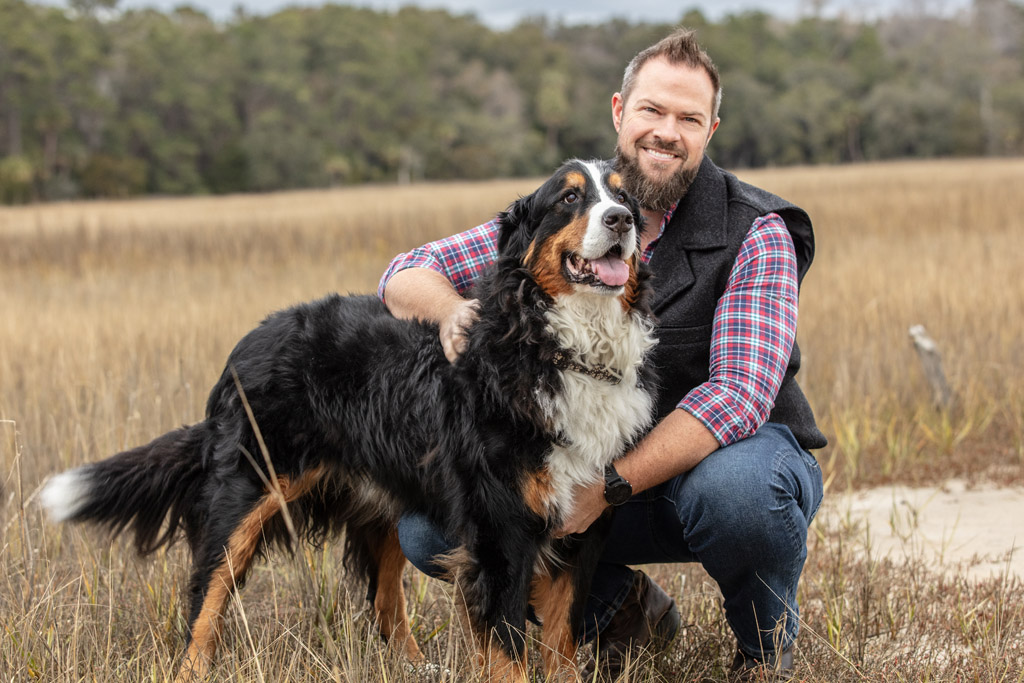Every region of the U.S. has its own pet concerns based on climate, plants, predators, etc. What sorts of things do you wish every new resident to our area was aware of, in terms of caring for pets?
Much of what we see on an emergent basis translates well to pets in any part of the U.S. There are a few aspects of veterinary medicine here in the Lowcountry that come with the territory.
• Sago palms are an ornamental palm that are found in just about every corner of this area. They are liver toxic from root to leaf, but especially dangerous are the seeds that are about the size of an avocado pit, that dogs love to play with.
• Snakes are very active during the warmer months. Copperhead bites are the most common, though we also have the cottonmouth and timber rattlers. Copperhead snakes love pine straw and to nestle under bushes. They don’t shy away like other snakes – they will hold steady to try to not be detected, and they will strike if provoked. The bite causes intense pain and oozing of blood from the site of the bite. Fortunately, we stock an antidote, which can be expensive, but very helpful in treating snake bites.
• The Southeast also brings high temperatures, which are compounded by our sometimes extreme humidity during the summer months, leading to heat stroke. We recommend keeping your pets’ activity to the cooler mornings if possible, and never leave them in a car, even if the windows are down.

What services does Carolina Veterinary Critical Care provide?
We are equipped to handle just about any emergency, including simple outpatient visits, 24-hour hospitalization, and surgery. We try to complement your local veterinarian’s service by extending our hours to cover urgent cases when they might not be open.
Rarely do we see patients that we cannot treat to the full extent of their needs. In cases that are beyond our scope of care, we are very honest and candid in our approach, and there are a few facilities within driving distance that we refer to for more advanced care.
Always keep in mind, if you feel your pet needs to be seen, no matter how great or small the problem may be, if you feel it’s an emergency, we feel it’s an emergency. We much prefer an overreaction than an underreaction. If you’re not sure if your pet is in need of emergency help, call us so we can help you make that decision.
Just because you are home doesn’t mean you’re alone. We are happy to be your lifeline.
Which animals do you feel comfortable seeing? We’re assuming dogs and cats are seen on the regular. Are there any other species you specialize in?
We currently limit our practice to dogs and cats. While other species may seem similar, there are profound differences in their physiology and treatments, and they are best left to those specially trained in exotics and wildlife.
When did you know you wanted to pursue this as a career?
I was really set on being a professional football player as a child, though it was pretty obvious early on that my genetics had a different plan!
I was about 8 years old when my father planted the seed of veterinary medicine because of my love of animals. That idea took root very quickly.
My love for emergency medicine came much later – I found the unpredictability of emergency medicine very enjoyable. The need for quick and decisive thinking and requisite breadth of knowledge in any disease process put in front of me I found a very rewarding challenge. It’s like reading a really good book – you just can’t put it down. You never know what awaits as you turn the page, and never a dull moment!
Are there any supplements or types of food you endorse to promote longevity in pets?
I truly believe the best strategy for longevity is to keep your pet lean. An athletic animal will lead a happier, longer, and more comfortable life.
In addition, I am a big fan of probiotics, to promote a positive microbial balance within the body, called our “microbiome,” a fascinating new facet of veterinary medicine that is ever evolving and proving to be more important than we ever thought.
In addition, omega 3 fatty acid supplements are anti-inflammatory and very good for joint health.
What is your personal all-time favorite breed of dog?
I’ve always been enamored with the Swiss Mountain dog. They are strong, sweet, and beautiful! A point of contention in our home, my wife lobbies very aggressively for the Clumber Spaniel. She a sucker for the droopy, sweet puddles of cuddles.
What sort of “people medicines” are safe for pets – and which are not?
While there is a fair amount of crossover from human to veterinary medicine, the intentional or accidental administration of human medications in our pets is one of the top causes for us to see your pet. If you feel your pet may need medications, it’s best to not trust Dr. Google, but to discuss medications with a veterinary professional, ensuring the pet’s safety. Our understanding of toxicology is always marching forward, so we might know more than a simple Google search will tell you. We may have safer ways of treating with greater success.
What is your favorite part about the job? Least favorite?
My favorite part of the job is the look on an owner’s face when they realize that everything is going to be OK. When you earn someone’s trust, and you can see it in their eyes – it’s transformative.
My least favorite part of the job, as I’m sure you can guess, is euthanasia. It’s a blessing to be able to ease suffering and let animals go with a little dignity, but it’s challenging.
Give us your list of OBVIOUS people foods to avoid for new pet owners.
Most people foods, in moderation, aren’t bad. There are a few you should be leary of:
• Grapes and raisins can cause kidney injury.
• Caffeine and chocolate can cause heart issues, even seizures.
• Bones can cause bowel perforations, obstructions, and colonic impactions – all of which can be life threatening.
• High-fat foods can cause pancreatitis and GI distress.
• Corn cobs can cause bowel obstructions.
• Onions can be toxic, especially to cats.
• Be very cautious with anything sugar-free, as it can often contain a sugar alternative called Xylitol, which can be a very serious intoxication.
My personal preference is to keep people foods on your plate, not theirs. There can certainly be exceptions, though I’d recommend you clear those with your veterinarian before you feed them to your pet.


